Have you ever noticed how you feel more alert during the day and sleepy at night? This is due to your circadian rhythm, or your body’s internal clock that regulates your sleep-wake cycle. Light exposure plays a crucial role in synchronizing your circadian rhythm, with blue light being particularly impactful.
Blue light, which is emitted at high levels from electronic devices and LED bulbs, can disrupt your biological clock, affect melatonin production, and ultimately lead to sleep disturbances and overall health issues. Let’s delve deeper into the impact of blue light on circadian rhythm and explore ways to manage its effects.
Key Takeaways:
- Circadian rhythm is the body’s internal clock that regulates the sleep-wake cycle
- Light exposure, particularly blue light, plays a significant role in synchronizing circadian rhythm
- Blue light can disrupt melatonin production and lead to sleep disturbances and health issues
What is Circadian Rhythm?
Circadian rhythms are the biological processes that follow a roughly 24-hour cycle, regulating our sleep-wake cycle and other bodily functions. These rhythms are controlled by an internal biological clock, also known as the suprachiasmatic nucleus (SCN), located in the hypothalamus of the brain.
The SCN receives cues from light exposure, which helps to synchronize the internal clock with the external environment. In turn, the SCN regulates the production of melatonin, a hormone that helps to control the sleep-wake cycle. The production of melatonin typically increases in the evening and decreases in the morning, signaling to the body when it is time to sleep and when it is time to wake up.
When the internal clock is functioning properly, we feel alert and awake during the day and sleepy at night. However, disruptions to the circadian rhythm can lead to sleep disturbances and other health issues. In the next section, we will explore the role of light in regulating the circadian rhythm and its impact on our health.

The Role of Light in Circadian Rhythm
Light exposure plays a crucial role in regulating our circadian rhythm, also known as our biological clock. The circadian rhythm is a natural, internal process that regulates our sleep-wake cycle, and other bodily functions, such as hormone release and body temperature.
The primary driver of the circadian rhythm is exposure to light, specifically the blue light wavelength. Blue light is present in natural sunlight but is also emitted by electronic devices such as smartphones, tablets, and laptops. This means that even when you are indoors, you are still exposed to blue light.
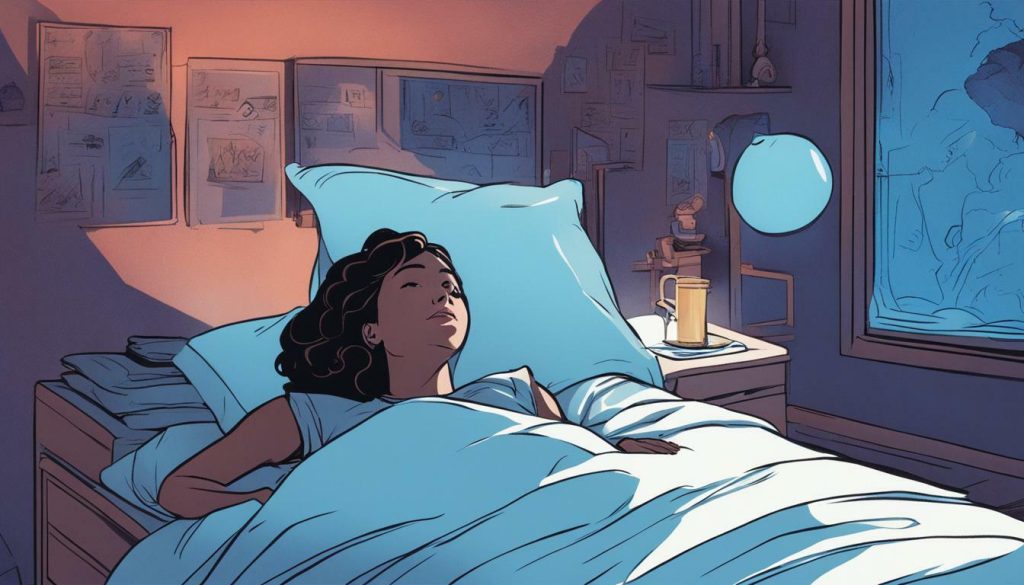
When we are exposed to blue light, it suppresses the production of melatonin, a hormone that regulates our sleep-wake cycle. This is because our bodies associate blue light with daylight, which signals to our internal clock that it is time to be awake and alert.
This can be problematic when we are exposed to blue light in the evening because it disrupts our natural sleep-wake cycle. As a result, we may have difficulty falling asleep or staying asleep, leading to sleep disturbances and daytime fatigue.
Common sources of blue light exposure include electronic devices, LED lights, and fluorescent bulbs. It is important to manage your exposure to blue light to maintain a healthy circadian rhythm.
Blue Light and Melatonin Production
Blue light can have a significant impact on our sleep-wake cycle and melatonin production. Melatonin is a hormone that helps regulate our circadian rhythm and is essential for quality sleep. However, exposure to blue light, particularly in the evening, can disrupt the production of melatonin, leading to sleep disturbances and a disrupted circadian rhythm.
Studies have shown that exposure to blue light suppresses the production of melatonin in the brain, reducing the levels of this hormone needed for quality sleep. This can lead to difficulty falling asleep, staying asleep, and waking up feeling refreshed.
One study found that exposing individuals to blue light before bedtime reduced the production of melatonin by up to 50%. Another study showed that individuals who used electronic devices with blue light-emitting screens before bedtime experienced a delayed onset of melatonin production, leading to a delay in the timing of sleep onset.
Reduced melatonin levels have also been linked to various health concerns, including an increased risk of cancer, diabetes, and obesity. Therefore, controlling exposure to blue light in the evening is essential for maintaining optimal health and well-being.
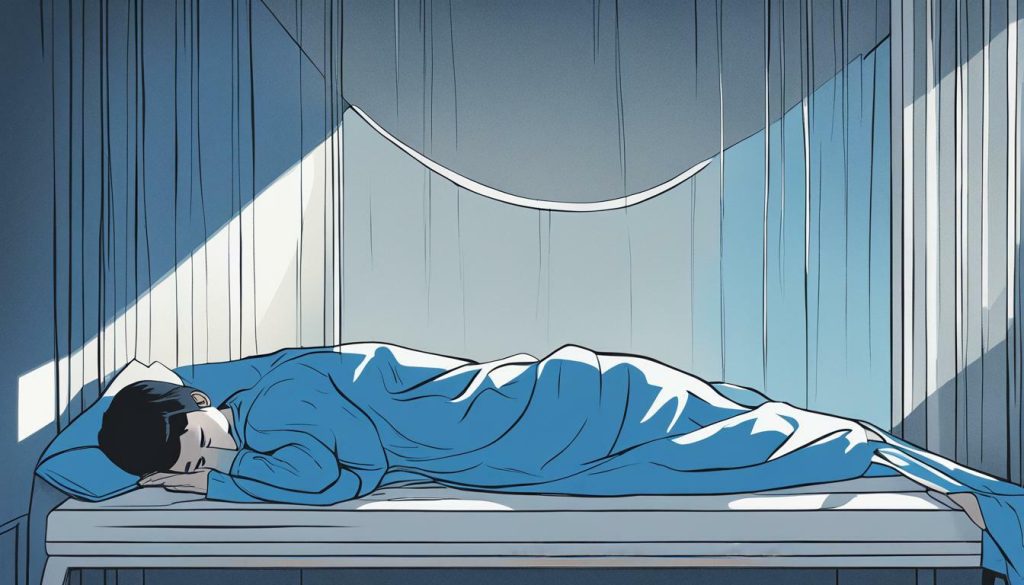
The Effects of Blue Light on Sleep
Excessive exposure to blue light, especially in the evening, can have adverse effects on our sleep. Studies have shown that blue light disrupts our circadian rhythm, making it harder for us to fall asleep at night and wake up in the morning.
The reason for this is that blue light suppresses the production of melatonin, a hormone that regulates our sleep-wake cycle. When we are exposed to blue light, our body thinks it is still daytime and reduces melatonin production. This disruption of our circadian rhythm can lead to sleep disturbances, insomnia, and daytime fatigue.
Furthermore, research has found that circadian rhythm disruption caused by blue light exposure has negative implications for overall health, including increased risk for conditions like obesity, diabetes, and cardiovascular disease.
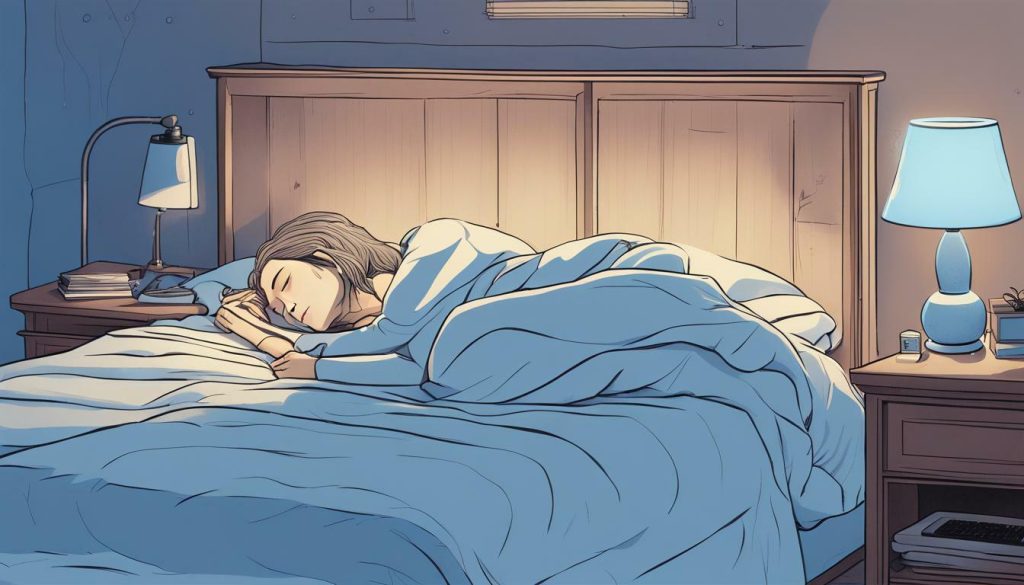
To minimize the effects of blue light on sleep, it is recommended to reduce exposure to blue light in the hours leading up to bedtime. This can be achieved by avoiding electronic devices like smartphones and laptops or by using blue light filters or apps that adjust the color temperature of your screen.
Additionally, incorporating a healthy sleep routine can help regulate your circadian rhythm. This includes practicing good sleep hygiene, like establishing a regular sleep schedule, avoiding caffeine and alcohol before bed, and creating a relaxing sleep environment.
Blue Light and Mood
Excessive exposure to blue light can have a negative impact on our mood and mental well-being. When our circadian rhythm is disrupted due to blue light exposure, it can lead to symptoms of anxiety, irritability, and even depression.
Research suggests that disrupted circadian rhythms can contribute to the development of seasonal affective disorder (SAD) and other mood disorders. The consistent exposure to blue light from electronic devices can lead to a disruption in our biological clock, which can worsen the symptoms of these conditions.
It is important to be mindful of our exposure to blue light, especially in the evening when our bodies are preparing for sleep. Managing our exposure to blue light can lead to improved mood and overall well-being.
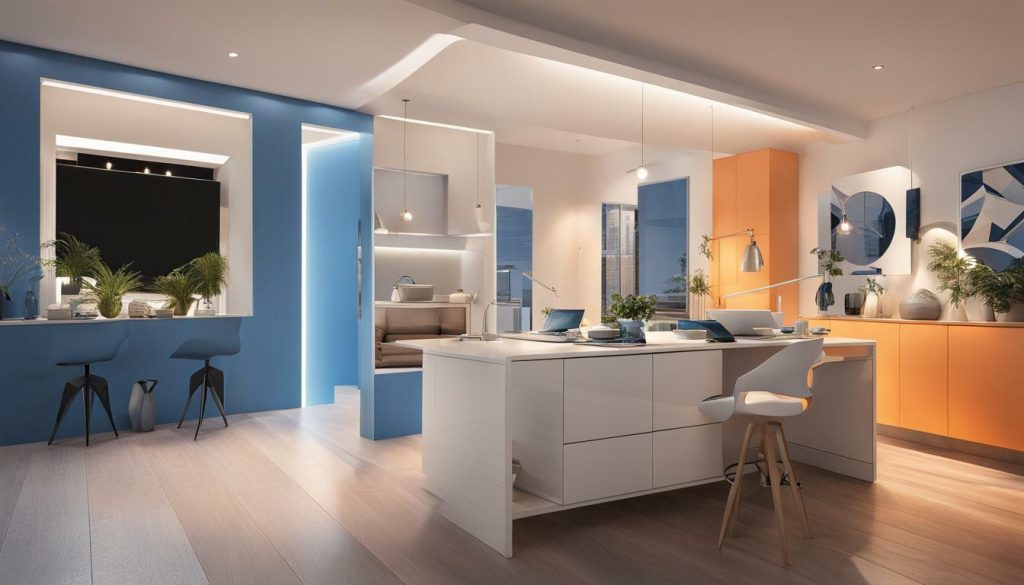
“A lack of exposure to natural daylight, coupled with exposure to excessive blue light from electronic devices, can have a negative impact on our mood and mental health.”
Managing Blue Light Exposure
Reducing exposure to blue light is crucial for regulating circadian rhythm and improving sleep quality. While it may be tempting to spend hours scrolling through your phone or working on a computer late into the night, it could be doing more harm than good.
One effective method for managing blue light exposure is through the use of light therapy. This involves using a light box that emits bright light to mimic natural sunlight and regulate circadian rhythm. Light therapy has been shown to be effective in treating seasonal affective disorder (SAD) and other mood disorders.
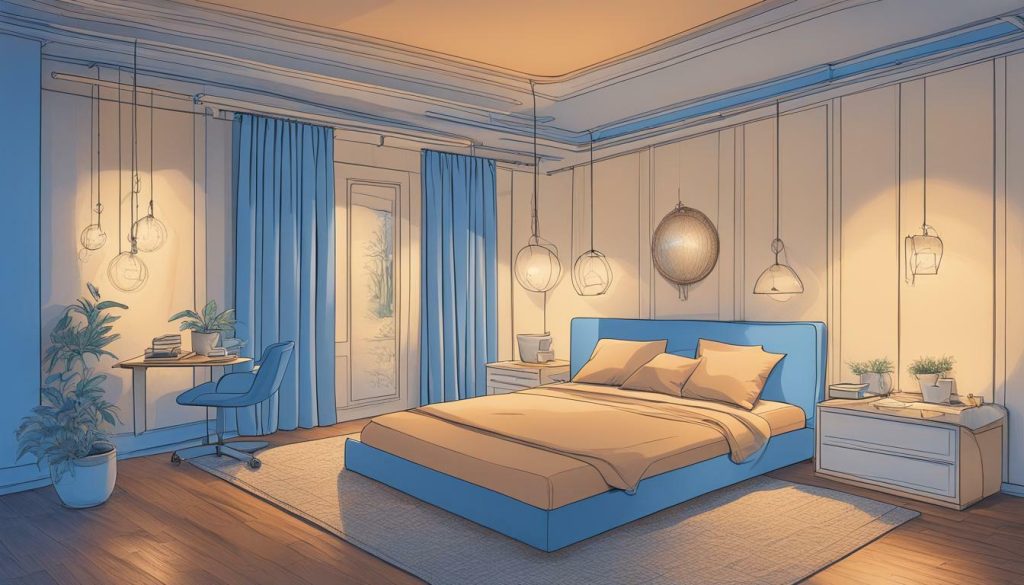
But even without a light therapy box, there are other simple ways to reduce blue light exposure. Adjusting the brightness and color temperature of electronic devices, using blue light filters and apps, and limiting screen time before bed are all effective ways to manage blue light exposure.
It’s also important to incorporate healthy habits into your daily routine to support a healthy circadian rhythm. This includes establishing a regular sleep schedule, getting plenty of natural sunlight during the day, and avoiding caffeine and alcohol before bedtime.
Blue Light and Health Risks
While blue light exposure has its benefits during the daytime, prolonged exposure in the evening can have adverse effects on our circadian rhythm and overall health.
Studies have shown that exposure to blue light in the evening can disrupt our natural sleep-wake cycle, leading to sleep disturbances and even insomnia. This disruption can have negative effects on our mood, cognitive function, and overall well-being.
Additionally, blue light exposure has been linked to potential risks to eye health, including macular degeneration and retinal damage. While the evidence is still emerging, it is recommended to take precautions to reduce excessive exposure, especially at night.
To minimize the negative effects of blue light exposure, it is important to manage our light exposure and maintain a healthy circadian rhythm. This can be achieved through measures such as reducing screen time in the hours leading up to bedtime and using blue light filters and apps to minimize exposure from electronic devices.
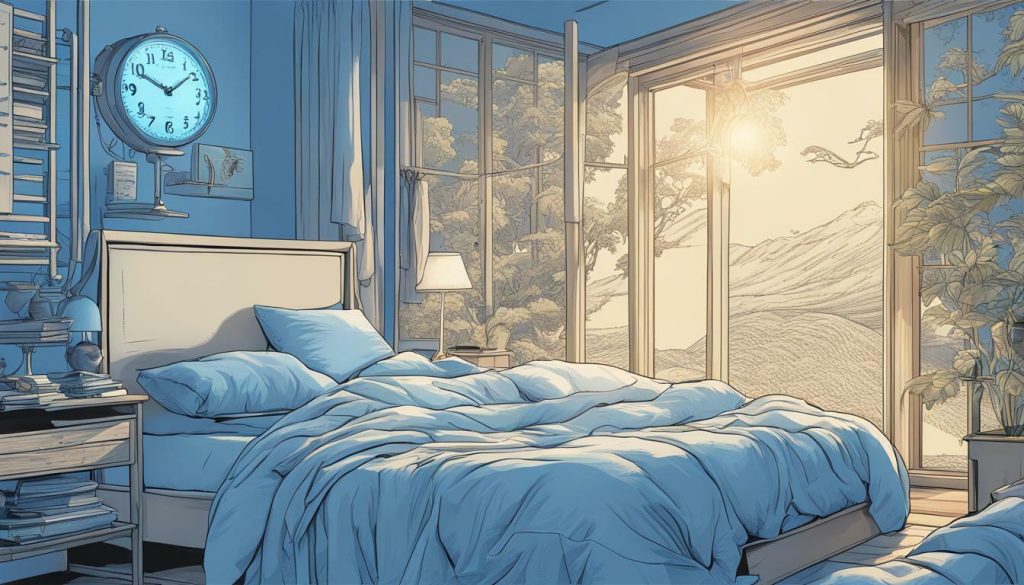
By taking steps to reduce blue light exposure and promote a healthy circadian rhythm, we can improve our sleep quality and overall health.
Blue Light Filters and Apps
For those who spend a significant amount of time on electronic devices, blue light filters and apps can be a helpful tool for reducing exposure to blue light and managing circadian rhythm. These filters and apps work by reducing the amount of blue light emitted by electronic screens, making it easier on the eyes and less disruptive to the internal clock.
Some popular blue light filter apps include F.lux, Twilight, and Night Shift. These apps are available for both mobile devices and computers and can be customized to adjust the level of blue light filtering based on personal preferences.
Additionally, many devices now come with built-in blue light filters, such as Apple’s Night Shift mode and Samsung’s Blue Light Filter. These built-in filters can be accessed through device settings and can also be customized to fit individual needs.
While blue light filters and apps can be effective in reducing exposure to blue light, it’s important to note that they should not be relied on as the sole solution for managing circadian rhythm. Other strategies, such as reducing overall screen time and avoiding electronic devices before bedtime, are also crucial for maintaining a healthy sleep-wake cycle and overall well-being.
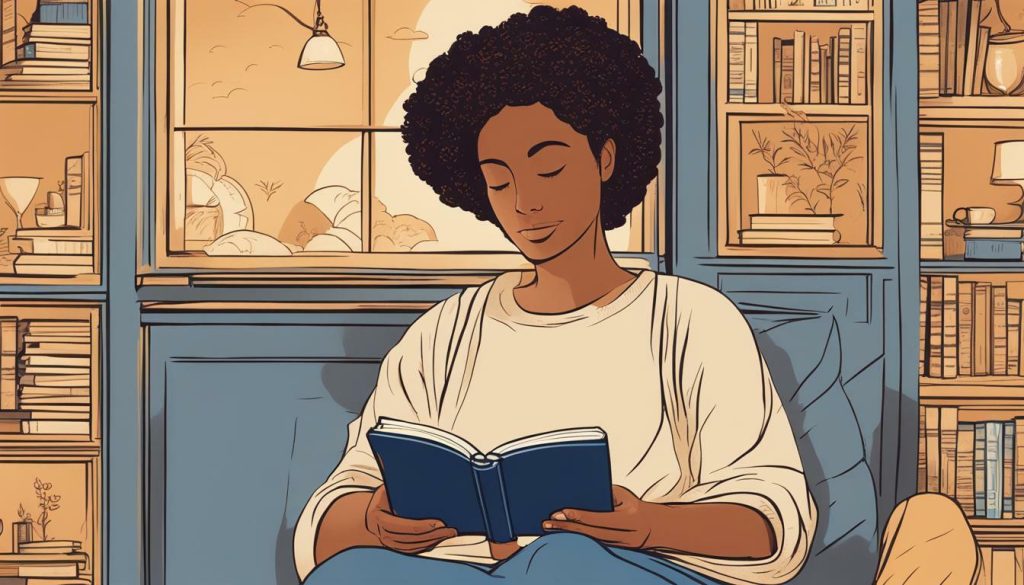
Using blue light filters and apps can help reduce exposure to blue light.
The Importance of a Healthy Circadian Rhythm
A healthy circadian rhythm is essential for overall health and well-being.
When our circadian rhythm is disrupted, it can lead to sleep disturbances, mood disorders, and a range of other health issues. A properly functioning sleep-wake cycle, on the other hand, is linked to improved cognitive function, better physical health, and a lower risk of chronic diseases.
By managing our exposure to blue light and maintaining healthy sleep habits, we can protect our circadian rhythm and improve our overall health. This may include using blue light filters or apps, incorporating light therapy into our daily routine, and establishing a consistent sleep schedule.
It’s important to prioritize our sleep and take proactive steps to support a healthy circadian rhythm. By doing so, we can enjoy improved energy, better mood, and a greater sense of vitality in our daily lives.
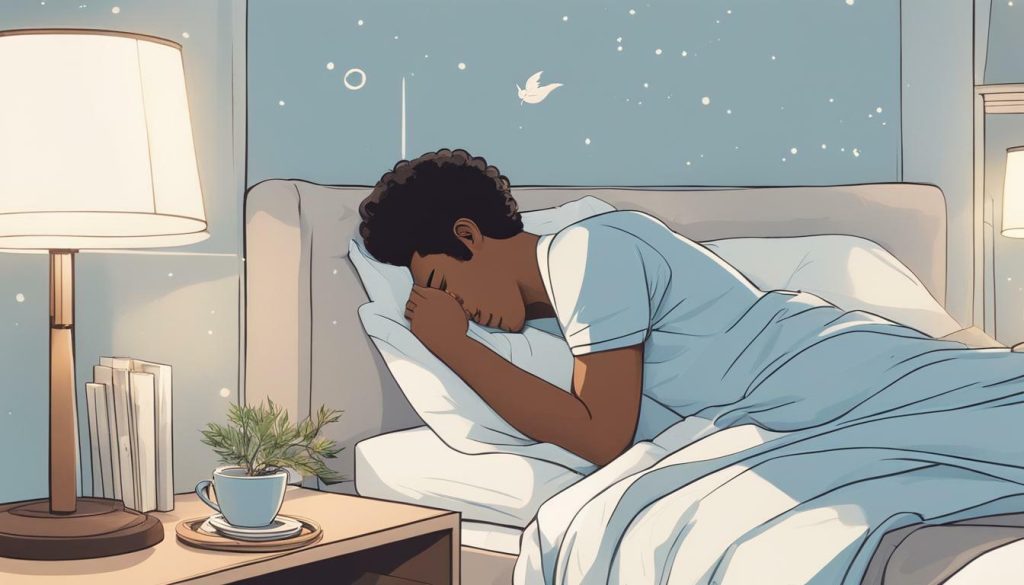
Research and Future Directions
As research on the relationship between circadian rhythm and blue light exposure continues to evolve, many questions remain unanswered. Ongoing studies are exploring the impact of blue light on sleep disturbances, cognitive function, and overall health.
One promising area of research is the potential use of light therapy to regulate circadian rhythm and improve sleep quality. Studies have shown that light exposure in the morning can help reset the biological clock and reduce sleep disturbances at night.
Future Research
Further research is needed to fully understand the biological mechanisms underlying the effects of blue light on circadian rhythm and overall health. This includes exploring the long-term consequences of disrupted sleep patterns and the potential for blue light exposure to increase the risk of chronic health conditions such as obesity, diabetes, and cardiovascular disease.
Additionally, more research is needed to investigate the effectiveness of blue light filters and apps in reducing exposure to blue light from electronic devices. While these tools show promise, their true impact on sleep quality and overall health needs to be thoroughly evaluated.
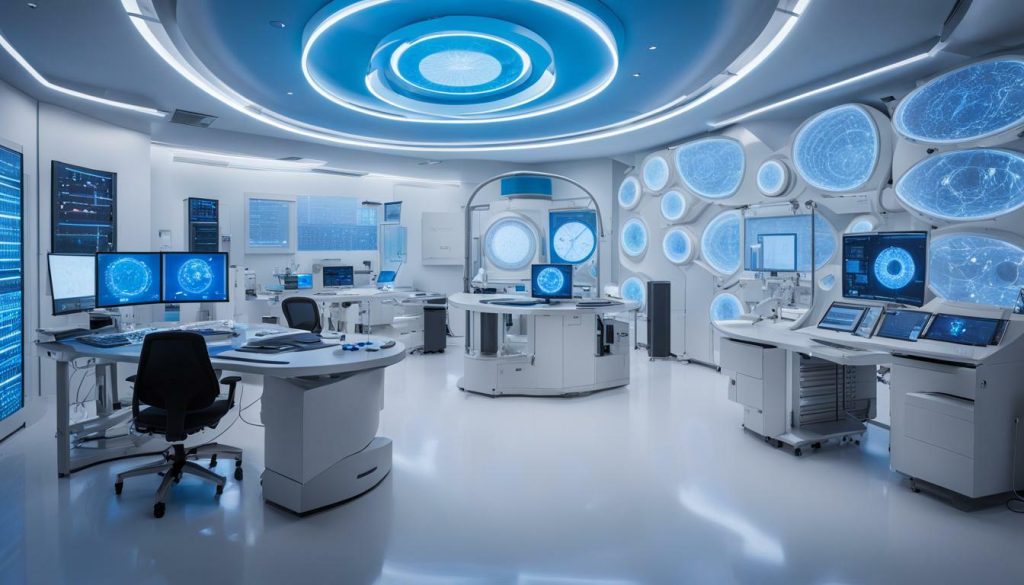
Overall, continued research in this field will be critical for developing effective interventions to address the negative impacts of blue light on circadian rhythm and overall health.
Conclusion
Managing blue light exposure is crucial for maintaining a healthy circadian rhythm and promoting overall health. As we’ve seen in this article, our biological clock relies on light exposure to function properly, and blue light in particular can disrupt our sleep-wake cycle and melatonin production, leading to sleep disturbances and mood disorders.
However, there are several ways to manage blue light exposure and minimize its adverse effects on our health. Light therapy, blue light filters and apps, and reducing our use of electronic devices before bedtime are all effective strategies that can help regulate our circadian rhythm and improve sleep quality.
It’s important to note that maintaining a healthy circadian rhythm has far-reaching implications for our overall health. From immune function to metabolism, a properly functioning sleep-wake cycle is essential for optimal physical and mental well-being.
Takeaway
To ensure a healthy circadian rhythm and promote optimal health, it’s important to manage our exposure to blue light. By implementing simple strategies like using blue light filters and apps or reducing electronic device use before bedtime, we can improve our sleep quality and overall well-being.
FAQ
Q: What is circadian rhythm?
A: Circadian rhythm is our body’s natural internal clock that regulates our sleep-wake cycle and various physiological processes. It is responsible for maintaining our biological rhythm and ensuring our body functions optimally.
Q: How does light affect circadian rhythm?
A: Light exposure plays a crucial role in synchronizing our circadian rhythm. It helps regulate our sleep-wake cycle and influences the production of melatonin, a hormone that controls sleepiness and alertness.
Q: What is blue light?
A: Blue light is a type of light with a short wavelength that is emitted by electronic devices, fluorescent lights, and the sun. It is known to have a significant impact on our circadian rhythm and can disrupt our sleep patterns if exposed to it excessively, especially in the evening.
Q: How does blue light affect melatonin production?
A: Blue light suppresses the production of melatonin, making it harder for us to fall asleep and maintain a regular sleep schedule. Excessive exposure to blue light, especially before bedtime, can disrupt our circadian rhythm and lead to sleep disturbances.
Q: What are the effects of blue light on sleep?
A: Excessive exposure to blue light can lead to sleep disturbances and a disrupted circadian rhythm. It can make it harder to fall asleep, decrease the quality of our sleep, and contribute to feelings of fatigue and daytime sleepiness.
Q: How does blue light affect mood?
A: Blue light exposure, especially at night, can affect our mood and mental well-being. It has been linked to conditions like seasonal affective disorder (SAD) and depression. Disrupted circadian rhythm, caused by blue light exposure, can have a negative impact on our overall mood and emotional state.
Q: How can I manage blue light exposure?
A: There are several ways to manage blue light exposure. You can limit screen time before bed, use blue light filters or apps on electronic devices, and consider using light therapy to regulate your circadian rhythm. Creating a sleep-friendly environment and practicing good sleep hygiene can also help reduce the impact of blue light on your sleep.
Q: Are there any health risks associated with blue light exposure?
A: Prolonged exposure to blue light has been associated with potential health risks. It can contribute to eye strain and discomfort, affect cognitive function, and disrupt our overall well-being. However, more research is needed to fully understand the long-term effects of blue light exposure.
Q: Can blue light filters and apps help reduce exposure?
A: Yes, there are blue light filters and apps available that can help reduce exposure to blue light from electronic devices. These tools adjust the color temperature of your screen to reduce the amount of blue light emitted. Using them effectively can help minimize the impact of blue light on your circadian rhythm and sleep quality.
Q: Why is a healthy circadian rhythm important?
A: Maintaining a healthy circadian rhythm is crucial for overall health and well-being. It helps regulate our sleep-wake cycle, supports proper functioning of various physiological processes, and improves our mood and cognitive function. A properly functioning circadian rhythm is essential for optimal health.
Q: What does current research say about circadian rhythm and blue light?
A: Current research suggests that blue light exposure can disrupt circadian rhythm and contribute to sleep disturbances. Ongoing studies are exploring the potential implications of blue light on overall health and well-being. Future research in this area may provide further insights into managing and mitigating the effects of blue light on our sleep patterns.

